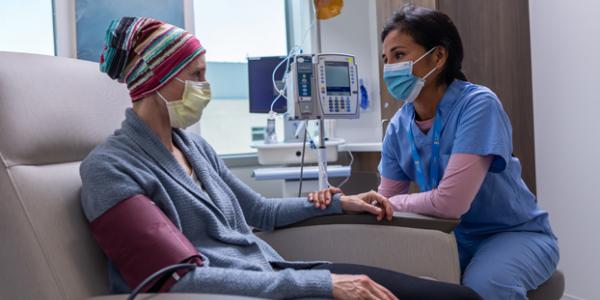
Non-Hodgkin Lymphoma

Contact Us
Call 650-988-8338 |
Monday – Friday, 8 a.m. – 5 p.m.
New patient appointments available within 48 hours.
Non-Hodgkin lymphoma (also called non-Hodgkin's lymphoma) is a type of cancer that affects the lymphatic system, part of the body's immune system. Non-Hodgkin lymphomas begin when a type of white blood cell (a T cell or B cell) becomes abnormal. The cell divides again and again, making more abnormal cells that can spread to other parts of the body. Non-Hodgkin lymphoma may be low grade (slow growing), intermediate grade or high grade (fast growing).
B-cell lymphomas are far more common than T-cell lymphomas and make up 85% of all lymphoma diagnoses in the U.S. Types of B-cell lymphoma include:
- Mantle cell lymphoma
- Marginal zone lymphoma
- Follicular lymphoma
- Diffuse large B-cell lymphoma
El Camino Health's cancer program brings together a team of doctors chosen for their superior educational background, specialty training and proven expertise. They understand the toll cancer takes on you physically, mentally and emotionally, and they’re experienced in treating all types of lymphoma.
Our doctors often see new patients within 48 hours of diagnosis and begin treatment as soon as possible. Experienced surgeons, radiation oncologists and medical oncologists work together to create a personalized treatment plan for you. Our team of cancer care professionals deliver expert, compassionate care and support for you and your family.
Skip
Symptoms and Early Detection
Non-Hodgkin lymphoma can cause many symptoms, such as:
- Swollen, painless lymph nodes in the neck, armpits or groin
- Unexplained weight loss
- Fever
- Soaking night sweats
- Coughing, trouble breathing or chest pain
- Weakness and tiredness that don't go away
- Pain, swelling or a feeling of fullness in the abdomen
Most of the time, doctors don't know why a person gets non-Hodgkin lymphoma. You are at increased risk if you have a weakened immune system or have certain types of infections. Men are higher risk than women, and risk also increases with age. Exposure to certain chemicals (such as those in insecticides) and drugs (such as those used in chemotherapy) may increase your risk.
There's no routine screening test for non-Hodgkin lymphoma. If you have symptoms, talk to your doctor about it right away. The sooner you are referred for diagnosis and treatment, the more likely you can be treated effectively and fully recover.
Diagnosis and Treatment
To determine whether you have non-Hodgkin lymphoma, a doctor will perform a physical exam and check body areas with lymph nodes to feel if they are swollen. To confirm the diagnosis, a biopsy to test lymphatic tissue for cancer is usually needed. If an entire lymph node is removed for testing, it is called an excisional biopsy. If just a small part of a tumor or lymph node is removed, it is called an incisional biopsy.
Other tests you might need include:
- Blood tests to check protein levels, liver function, kidney function and uric acid level
- Complete blood count (CBC)
- Computed tomography (CT or CAT) scans of the chest, abdomen and pelvis
- Bone marrow biopsy
- Positron emission tomography (PET) scan
The best treatment for you depends on the stage of your cancer, your age and overall health, your personal preferences and other factors. Your treatment plan might involve:
- Watching and waiting. Your cancer may not need treatment right away.
- Chemotherapy. Several drugs have been shown to effectively treat non-Hodgkin lymphoma.
- Radiation therapy. Radiation can kill the cancer cells. In targeted therapy, the drug focuses on specific molecules in the cancer cells to more precisely target and destroy them. In radioimmunotherapy, a radioactive substance is linked to an antibody that targets the cancer cells, and then the substance is injected into the body.
- Blood or platelet transfusions. These may be needed if blood counts are low.
Clinical Trials
The El Camino Health Cancer Center works with other medical centers and the National Cancer Institute to offer you the opportunity to participate in ongoing clinical trials. Ask your doctor if a clinical trial is right for you.
Contact a Program Specialist
To make an appointment, get information, schedule a consultation or refer someone, call 650-988-8338.
Cancer Center Reports



